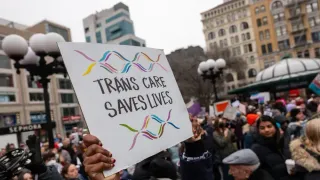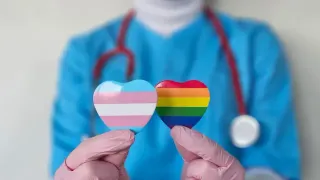December 3, 2017
Agency Provides Lifeline to HIV Clients in SF
Matthew S. Bajko READ TIME: 4 MIN.
For Hal Christiansen, who has lived with HIV for three decades, the AIDS case management services he receives from Westside Community Services have been invaluable in helping him to recover from a stroke he suffered in April 2002 and severe depression following the deaths of his parents.
He first turned to the nonprofit for help 10 years ago and receives home visits from both a social worker and a nurse at his apartment near San Francisco's Russian Hill neighborhood. One time, his social worker brought Christiansen to UCSF's Alliance Health Project and sat in on the intake interview with him.
"I couldn't talk, I was so overwhelmed," recalled Christiansen, 64, adding that his social worker was able to answer any questions on his behalf "and got me the help I needed. His kindness really stood out for me."
Over the years the Westside employees that have worked with Christiansen, a gay man who had been a litigation secretary, have gone out of their way, he said, to see that he receives the social support and medical care he needs. His last nurse, for instance, stepped in to ensure he could see a dentist after Christiansen was having trouble securing an appointment.
"I have a private doctor who specializes in HIV, but I really rely on Westside Community Services," said Christiansen. "I don't know where else in the community I would go to get such good service."
So when the agency announced earlier this year that it would have to end its case management as well as health home care programs for people living with HIV or AIDS due to a lack of funding, Christiansen urged the nonprofit's leaders to do everything they could to continue the programs.
"I was terrified because I really depend on Westside for medical services," said Christiansen.
The agency, which just celebrated its 50th anniversary, has served hundreds of HIV positive San Francisco residents since launching its AIDS Case Management Program in 1988. It is the only Medi-Cal Waiver funded program in the city.
But Westside has struggled to maintain the critical services for its HIV clients, as it had not received a rate increase over the past decade. Most of the agency's AIDS case management clients meet state Medi-Cal eligibility requirements and are thus ineligible for services funded by the federal Ryan White Treatment Modernization Act within the San Francisco Department of Public Health.
"The funding is a really difficult piece. There was a time when it was plentiful, but there is really little funding for prevention," Westside CEO Mary Ann Jones, Ph.D., told the Bay Area Reporter in a recent interview. "HIV and AIDS services is getting much less attention than it has gotten."
The nonprofit's board had voted to end both the case management and health home care programs on September 1. But after the state Department of Health Care Services announced a significant rate increase to the Medi-Cal Waiver Program for the fiscal year that started July 1, Westside rescinded its decision to close the programs. According to the agency, its rates went up from $400 to $600 a month per client and the additional revenue will fund the programs and eliminate the structured deficit carried by Westside over the past decade.
"I don't anticipate we will have that problem again," said Jones, 56, who is straight and started at the agency in 2004 as its clinical director. "It is unfortunate organizations were put in a position where they would not be able to provide services."
The agency, with a total budget of $11 million and administrative offices housed in an old Victorian on Oak Street near Divisadero, was one of the first in the city to provide people living with HIV or AIDS a nurse and a social worker that visit them at home.
"It provides better continuity of care," said Craig Hutchinson, 53, a gay man who has been Westside's director of HIV services since January 2016. "We see clients more often than their primary care physician. We advocate for their social work needs and medical care needs as well."
It currently works with 175 clients with HIV or AIDS. For those with less acute needs, Westside had planned to transition them to the Shanti Project or the Asian and Pacific Islander Wellness Center had it shuttered its programs. As for the 75 percent with more acute needs, it had not found another agency able to take on those clients, Hutchinson said.
The only option would have been for another county to provide the services to those clients, Jones said. Now, due to the reimbursement increase, Westside is planning to increase its capacity to see HIV and AIDS clients.
The agency is currently hiring two more social workers so it can see 80 more patients next year. Each social worker sees up to 40 patients. It has a waiting list of 10 people that it expects to clear once the new staffers are in place.
It already employs five nurses and four social workers for the AIDS programs, as well as three home care workers and two certified nursing assistants. It provides home care, from light cleaning and food shopping to escorting clients to see their doctor or visit a park for some fresh air, to those patients who are disabled or socially isolated.
"The services are top-notch," said Christiansen, "and the personnel is top-notch."
In order to receive Westside's HIV services, clients must live in San Francisco and meet the eligibility criteria for the Medi-Cal Waiver program.
To learn more about the agency, or to inquire about receiving its services, visit its website at http://www.westside-health.org .






